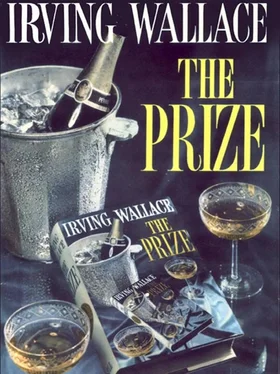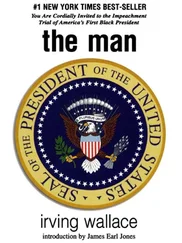‘Well, this is unexpected,’ he said in an undertone. ‘What brings you here? Are you writing for the newspapers? I thought you and Ingrid were happy to have the afternoon off.’
Krantz, absently manipulating a crooked metal puzzle in his hands as he sat absorbed in the questions and answers, acknowledged his older colleague. He brought a finger to his lips to indicate that silence must be observed in this holy place. ‘I could not miss the opportunity to hear the great Stratman,’ he whispered.
‘How does he handle himself?’ Jacobsson wanted to know.
‘With understandable assurance,’ said Krantz. ‘But they plague him with nonsensical questions. Our Swedish reporters are becoming as foolish as the Americans.’ He returned his gaze to the front of the room. ‘Soon we will arrive at the essentials.’
Looking from Krantz beside him to Professor Stratman almost out of sight in the recesses of a deep leather chair, Jacobsson was fascinated by the general similarity between his colleague and the Nobel laureate. Both were stunted men, almost dwarfish, like Charles Steinmetz, the electrical engineer, whom he had once met. Both, when seated, gave the impression of the human embryo curled within the amnion in the female womb. Both resembled round and wrinkled infants, incredibly advanced in age. This was the first and general impression-perhaps the one that unconsciously drew Krantz to his more celebrated counterpart-but, Jacobsson could see, the similarity dissolved when specific differences were considered at a second glance. Krantz, in his pinched suit, seemed the disapproving pedagogue; Stratman, in his baggy coat and trousers, seemed above criticizing or criticism. Krantz’s hair, dyed black, the porker features of his face, his sour mouth caught between moustache and goatee, gave one the feeling that here was disputer and complainant, analyzer and annotator, all but creator. Stratman’s outsized cranium, shiny red and almost hairless, his amused eyes all-seeing behind steel-rimmed bifocals, his nose as prominent as a Christmas tree decoration, the ready smile, gave one the feeling that here was genius so simple and assured and secure that it dwelt high above all mundane carpings and concerns and criticisms. Here was the originator. Here was the Maker. No wonder at Krantz’s reverence.
Jacobsson tried to concentrate on the laureate as mere man, not Maker, and momentarily regretted that he had to subject such a one to the low curiosity of the press.
How, he speculated, could a Stratman bring his lofty brain processes down from the rarefied summit to consider earthly matters of a telegram from Stockholm, a sea passage on a Swedish ship, a reaction to a Baltic community? Could Jacobsson have known the reality of the brain processes of the laureate, he would have had his answer and have been astonished.
For Professor Max Stratman, folded into the leather chair, one hand rubbing the meerschaum pipe, legs comfortably crossed, had his mind on matters of less than cosmic interest. Earlier, replying to questions about his trip from Atlanta to New York to Göteborg, he had been reminded that for the first time since the end of the war he was in a foreign country, no more than two or three hours from his native land, the land of his birth, and upbringing, and learning, and sorrow. Proximity evoked ancient memories: taking turns with Walther at the keyhole of the library for glimpses of the peasants his physician father treated in their country home; he and Walther running and skipping, beside his father, through the pungent grass, to the stable; Walther and Rebecca and the infant Emily-no, not infant, she had been older and hitting a rattle against the high chair-gathered about the table, to partake of the roast chicken, on Christmas Day when dinner was not lunch but dinner at noon, and he was there, glowing with pride in his family and with pleasure in the woollen muffler that Rebecca had knitted for him.
His thoughts had turned to his Emily-could he have imagined then that she would be his Emily?-and now he fixed on her, once more, as he had with compulsive regularity since the arrival in Stockholm. It was for Emily that he had made this long, risky journey, or perhaps less for Emily than for Walther and Rebecca and the remembrance of that Christmas noon.
Only after his arrival in Stockholm had Stratman authoritatively learned that the trip had not been necessary. The Nobel Foundation made occasional exceptions to the rule that their winners appear in person. He was told that when Ernest Hemingway won the literature prize, he had been recovering from a skull fractured and a spine broken in an African aeroplane crash, and he had been permitted to accept the $35,000 reward by post in Cuba. Had the Nobel givers known his own heart condition, they would, Stratman was sure, have granted him the same consideration as Mr. Hemingway. He decided for the tenth time, despite Dr. Ilman, that the trip had been worth the chance, rather than make public-to his colleagues and to Emily-his impairment.
The episode on the ship had proved him right. That last night at sea, even Emily’s slight security had been proved wanting. What on earth had possessed her to encourage that young man to violate her privacy, knowing full well that she was incapable of accepting his attentions? Ach , the distortions of the human head, forever substituting wish for reality. No doubt, it had been an irrational effort by Emily to stand on her own two feet, mature and independent of her Uncle Max, to cut the final umbilical cord. The not unexpected disaster had been a setback. Now, in Stockholm, she was edgier than at home, more withdrawn, and the evening before had even turned down the invitation of a gallant Swedish attaché to escort her to the opera. Yes, the episode on the ship had been the setback. It had reminded Emily that she was helpless, and certainly, Stratman told himself, it had reminded him of her need and his responsibility.
Dimly, he heard his name, and then realized that he had another responsibility, and that to perform attentively for his generous Nobel hosts.
‘Professor Stratman,’ the Stockholm Aftonbladet journalist was repeating, ‘would you not say that the Nobel Prize was given you more for an invention than for a discovery?’
‘I would put it this way, more precisely-I made a discovery, and then I made an invention.’
‘But it was the invention that won the prize, nevertheless.’
‘It is possible.’
‘Do you believe that this is in strict observance of Alfred Nobel’s wishes? While it is a fact that, according to his 1895 will, he offered one part of his money “to the person who shall have made the most important discovery or invention within the field of physics”, the Swedish Academy of Science has traditionally ignored inventions. After all, your American, Thomas Edison, who died only in 1931, did not win the Nobel Prize for that reason. How do you feel about this?’
Stratman studied his meerschaum a moment, then looked up. ‘It would be presumptous of me, a guest as well as a beneficiary of Mr. Nobel’s will, to comment on how the Academy of Science chooses to interpret that will.’ He paused, reconsidered, then resumed. ‘I think it would be fair to say this much. To the best of my knowledge, the prize in physics has frequently been given to inventions in physics. The Academy of Science has in no way ignored Mr. Nobel’s desires. Several examples come to mind. I think of Herr Guglielmo Marconi. In 1895, he invented the wireless telegraph. In England, using a kite as an aerial, he demonstrated that this invention worked. Soon he was building a radio station for the Pope and amassing a fortune of twenty-five million dollars for himself. In 1909, I believe, he was awarded half of the Nobel Prize for “services in the development of wireless telegraphy”. That is one case. I give you another, in another field. In 1903, my friend Willem Einthoven began constructing an instrument to detect heart ailments. In 1924, he won the Nobel Prize “for his discovery of the mechanism of the electrocardiogram”. That was an invention, pure and simple. A more recent case comes to my mind. In 1956, three Americans, William Shockley, John Bardeen, Walter Brattain, all of the Bell Telephone Laboratories, shared the Nobel physics prize for “their discovery of transistor effects”. This, too, was an invention, the invention of the transistor to replace vacuum tubes. It turned upside down the world of electronics. In those terms, is the photochemical system I have discovered to convert and store solar energy an invention? The answer is yes-it is an invention. Does this kind of invention fall within the boundaries of the Nobel awards? Again, evaluating against historical precedent, the answer is yes.’
Читать дальше












